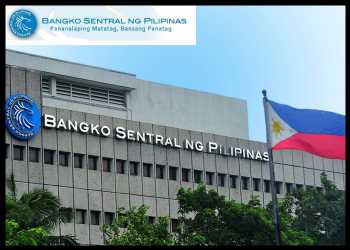Philippine Central Bank Not Done With Rate Hikes Yet
The Bangko Sentral Ng Pilipinas raised its key interest rate on Thursday for the eight policy session in a row and significantly lifted the inflation forecast for the year, as policymakers assessed that the already-high inflationary pressures have risen further.
The Monetary Board, led by Governor Felipe Medalla, hiked the interest rate on the BSP’s overnight reverse repurchase facility by 50 basis points to 6.0 percent, in line with economists’ expectations.
The interest rates on the overnight deposit and lending facilities were raised to 5.5 percent and 6.5 percent, respectively.
“In deciding to raise the policy interest rate anew, the Monetary Board noted that the latest baseline inflation forecast path has shifted higher relative to the previous assessment,” the BSP said in a statement.
The previous change in the interest rate was a 50 basis point hike in December and the rate is now at its highest level in 14 years.
Since the current policy tightening cycle began in May last year, the bank has raised interest rates by a total 400 basis points.
Read more: Philippine Inflation Rises To 8.7%, Highest Since December 2008
The bank forecast average inflation to breach the upper end of the 2-4 percent target range at 6.1 percent in 2023, before returning to within target at 3.1 percent in 2024.
The forecasts were adjusted upwards following the higher-than-expected inflation out-turn in January as well as the continued stronger rebound in domestic demand and gross domestic product, or GDP growth in the fourth quarter of 2022, the BSP said.
The Philippines’ inflation hit a 14-year high of 8.7 percent in January. Core inflation, which strips prices of fresh food and energy, is at a record high of 7.4 percent.
Capital Economics expects two more 25 basis-point hikes from the BSP over the coming months and ruled out rate cuts for the year that the firm had predicted earlier.
“We think inflation should peak this month and then drop back steadily over the remainder of the year as energy price inflation eases, food prices drop back and growth slows,” Capital Economics economist Gareth Leather said.
“But inflation is unlikely to return to target before the end of the year, much later than in other parts of the region.”
ING economist Nicholas Mapa expects a 25 basis point rate hike by the BSP at the March meeting and forecast the BSP’s terminal rate at 6.25 percent.
Services price growth has driven both headline and core inflation higher, and inflation expectations have risen further prompting the central bank to take action to curb the emergence of more second-round effects.
The Philippines has witnessed high food inflation over recent months, partly due to domestic shortages for key food items such as those of onions, fruits, and eggs, due to severe weather and the health scares such as avian flu.
Higher transport costs due to the rise in oil prices and bigger-than-expected wage adjustments are set to keep inflationary pressures elevated through this year.
The Monetary Board also reiterates its encouragement and support for timely and more aggressive whole-of-government actions to mitigate the impact of persistent supply-side pressures on food prices, including trade positive measures and significant progress to boost productivity.
“Given these considerations, the Monetary Board deems a strong follow-through monetary policy response as necessary to reduce the risk of a breach in the inflation target in 2024,” the BSP said.
Rate-setters hope than a policy interest rate hike would also prevent inflation expectations from drifting further away from the target band.
Further, policymakers also expect that the better-than-expected domestic growth in 2022 together with the monetary action can help to dampen potential demand-side pressures and second-round effects without unduly hindering the sustained momentum of economic growth.
Source: Read Full Article

